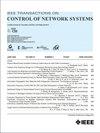物联网应用的低延迟 MAC:无显式状态信息共享的分散式队列优化调度
IF 4
3区 计算机科学
Q2 AUTOMATION & CONTROL SYSTEMS
引用次数: 0
摘要
本文章由计算机程序翻译,如有差异,请以英文原文为准。
A Low-Delay MAC for IoT Applications: Decentralized Optimal Scheduling of Queues Without Explicit State Information Sharing
For a system of collocated nodes sharing a time-slotted wireless channel, we seek a medium access control that provides low mean delay, has distributed control, and does not require explicit exchange of state information or control signals. We consider a practical information structure where each node has local information and some common information obtained from overhearing. We approach the problem via two steps: 1) we show that it is sufficient for the policy to be “greedy” and “exhaustive”; limiting the policy to this class reduces the problem to obtaining a queue switching policy at queue emptiness instants; and 2) by formulating the delay optimal scheduling as a partially observed Markov decision process, we show that the optimal switching rule is stochastic largest queue. Using this theory as the basis, we develop a practical, tunable, distributed scheduler, QZMAC, which is an extension to the existing ZMAC protocol. We implement QZMAC on standard off-the-shelf TelosB motes and also use simulations to compare QZMAC with the full-knowledge centralized scheduler and with ZMAC. We use our implementation to study the impact of false detection, while overhearing the common information, and the efficiency of QZMAC. Simulation results show that the mean delay with QZMAC is close to that of the full-knowledge centralized scheduler.
求助全文
通过发布文献求助,成功后即可免费获取论文全文。
去求助
来源期刊

IEEE Transactions on Control of Network Systems
Mathematics-Control and Optimization
CiteScore
7.80
自引率
7.10%
发文量
169
期刊介绍:
The IEEE Transactions on Control of Network Systems is committed to the timely publication of high-impact papers at the intersection of control systems and network science. In particular, the journal addresses research on the analysis, design and implementation of networked control systems, as well as control over networks. Relevant work includes the full spectrum from basic research on control systems to the design of engineering solutions for automatic control of, and over, networks. The topics covered by this journal include: Coordinated control and estimation over networks, Control and computation over sensor networks, Control under communication constraints, Control and performance analysis issues that arise in the dynamics of networks used in application areas such as communications, computers, transportation, manufacturing, Web ranking and aggregation, social networks, biology, power systems, economics, Synchronization of activities across a controlled network, Stability analysis of controlled networks, Analysis of networks as hybrid dynamical systems.
 求助内容:
求助内容: 应助结果提醒方式:
应助结果提醒方式:


